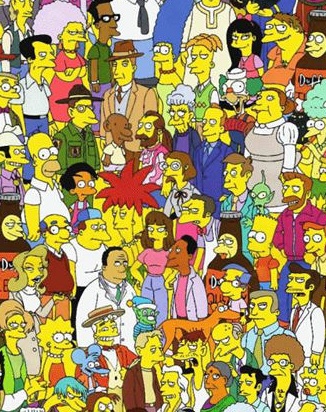 Quico says: On my trip to Caracas, I picked up a copy of "Opinion Prisoner: General Usón Speaks". It's a book of interviews with former Finance Minister and jailbird Francisco Usón by Agustín Blanco Muñoz. What follows is drawn from Usón's recollections of the evening of April 11th, 2002.
Quico says: On my trip to Caracas, I picked up a copy of "Opinion Prisoner: General Usón Speaks". It's a book of interviews with former Finance Minister and jailbird Francisco Usón by Agustín Blanco Muñoz. What follows is drawn from Usón's recollections of the evening of April 11th, 2002.There was a gun on Chávez's office table. A pack of cigarettes and a lighter, an ashtray with some stubs in it, an empty cup of coffee, and a gun. That's the detail that sticks out in General Francisco Usón's memories of going to Miraflores to resign his post as Finance Minister. It was about 8:30 p.m. on April 11th, 2002.
It's not the only detail, of course. He remembers people crying in the halls of Miraflores, army officers running from one place to the other like chickens with their heads cut off. He remembers José Vicente Rangel hanging about the scene like a sleepwalker, muttering to himself again and again that Chávez must not resign, that handing over power was unthinkable, that it had to be avoided at all cost, in a kind of loop, like a drunk you meet on an El Silencio sidewalk late at night. And he remembers Chávez's vacant, disoriented expression, how nervous he seemed, how it was impossible to tell if he was actually listening to you as you talked, the way his own speech bordered on the incoherent. The Chávez Usón saw that evening was despondent, defeated.
Mostly, though, he remembers that gun.
It couldn't have been for self-defense. When you keep a gun for protection you keep it in a holster, on your body. Usón, like Chávez, is an army man: it's not the kind of detail either of them would miss. A gun sitting on top of a table like that...it was only ever going to be used for one thing.
The thought alarmed Usón. He was seriously worried that if something happened to Chávez that night the country would careen towards civil war. He was concerned enough to consign his own handgun to one of the president's bodyguard before going in to see him. He even raised the importance of keeping Chávez safe as he resigned and, on his way out, went as far as to have a quiet word with one of Chávez's bodyguards to plead with him to hide that gun when he got a chance because "nothing must happen to Chávez."
That glimpse of a suicidal Chávez is not one Usón would forget. At 8:30 p.m. on April 11th 2002, Hugo Chávez genuinely thought his gig was up.
From Miraflores, Usón headed straight to the fifth floor of the Army General Command Center in Fuerte Tiuna, where he ran into the chaotic conspiratorial
verbena so many others have also described. The collapse of the chain of command was obvious to him right away. In the middle of the biggest military crisis Venezuela had seen in half a century, some of the assembled generals were drinking whisky.
General Efraín Vásquez Velasco, whom everyone looked to for leadership, was way out of his depth. He was the army's highest ranking officer, and the hierarchy-minded military men all around him were naturally waiting for his orders. But Vásquez Velasco hadn't thought things through. He hadn't planned ahead, hadn't
conspired. Needless to say, planning is critical to the success of a coup, and the guy everyone was looking to for leadership just hadn't done any.
Worse yet, the guys who
had planned were pushing a disastrous scheme to impose Pedro Carmona as president. In fact, Carmona's presence at Army headquarters that night was one of the first anomalies Usón noticed. The officers backing him - led by General Medina Gómez and Vice-admiral Ramírez Pérez - commanded no troops.
No mandaban ni en su casa, is how Usón puts it. And they weren't senior enough in the military hierarchy to tell Generals Vásquez Velasco and Alfonso Martínez what to do.
The real "power vacuum" that night wasn't in Miraflores, it was in Fuerte Tiuna. The army leadership was making it up as they went along, trying to run a coup "by consensus." In those circumstances, it wasn't hard for the real plotters to outmaneuver the hapless top brass.
Well before midnight, General Rosendo (who'd just resigned as head of the Armed Forces Unified Command) and General Hurtado Sucre (then Infrastructure Minister) go to Miraflores to negotiate a handover of power directly with Chávez. Very quickly, Chávez agrees to resign, but only if safe passage to Cuba is guaranteed for himself and his family. It's his only condition. Rosendo and Hurtado Sucre make the deal.
But the situation is fluid back in Fuerte Tiuna. Alliances shift by the minute and Vásquez Velasco completely fails to stamp his authority and impose a single course of action. So, as they try to work out the details, Rosendo and Hurtado Sucre find themselves negotiating under a mandate that changes again and again. They keep having to call Fuerte Tiuna to get instructions, but the instructions keep changing.
This provides Chávez with the first hint that he may not be as screwed as he'd figured. He asks to speak to Vásquez Velasco directly. They speak on the phone several times throughout the night. When Vásquez Velasco speaks to the president he goes into a small office by himself, so nobody can overhear what he's saying. The conversations follow on throughout the night.
Little by little Chávez starts to put 2 and 2 together. At 12:30, he calls Usón directly on his mobile and asks what's taking so long, why he isn't on a plane to Cuba yet. It's the first of six conversations between the two that night. Gradually, Chávez comes to understand it's all a bit of a bluff. Years later, in his prison cell, General Usón will have plenty of time to wonder whether he inadvertently tipped off Chávez. Maybe it was those phone calls that made Chávez realize that nobody was in overall command in Fuerte Tiuna.
Back in Fuerte Tiuna, one faction has gotten it into its head that sending Chávez off to Cuba would be a disaster. The guy would destabilize any new government from a distance, and besides, the blood that flowed down Baralt Avenue that afternoon was on his hands and he should be held accountable. Another faction argues that it's lunacy to think you can jail a guy passionately supported by 40 to 50% of the population. Characteristically, Vásquez Velasco fails to step in to resolve the dispute.
As the early morning wears on, General Rommel Fuenmayor calls Chávez and threatens to order some tanks and Air Force planes to bomb Miraflores palace if he doesn't leave power within 10 minutes. But Fuenmayor is an
army officer - and one without troops under his command at the time (the guy was running CAVIM, the army munitions manufacturer). Fuenmayor had no authority over the Air Force or over any tanks. In the end, his threat only underscores the extent to which the military chain of command has gone to all hell.
By the early morning hours of April 12th, the dazed, suicidal Chávez of the previous evening is just a memory. Sensing the weakness in the generals' position, he's well and truly snapped out of it and gone on Full Survival Mode. After all, if there's one subject he genuinely is a bit of an expert on it's military conspiracies...and how to survive them when they go wrong.
Just before 4:00 a.m. Chávez decides to go to Fuerte Tiuna to negotiate directly with the army brass. This is a detail that's been lost to history: Chávez doesn't
submit to an army order to go to Fuerte Tiuna, Chávez
decides to go there. He needs to be there to confirm his suspicions about the coupsters' disorganization. He goes flanked by his head of security and his head of Casa Militar, (the presidential protection garrison.) Both are armed and still loyal to him. Amid the confusion, nobody finds anything strange about that.
Once he gets there, Chávez quickly confirms what he'd suspected. Rather than being met by a single officer with a single negotiating position, Chávez is faced with a petit committée of
militares alzados. They demand that he sign a resignation letter. He asks about safe passage to Cuba. They start backsliding. Suddenly, they won't guarantee that he can get out of the country right away. Chávez notes that this is not the deal he'd agreed to. He realizes his choice now is between being a head of state who's illegally detained and being a former head of state who's legally detained. So he refuses, point blank, to sign the letter.
And the generals don't have the first fucking clue what to do next.
For General Usón, what follows was a turning point in the crisis. Faced with Chávez's refusal, the assembled generals make a decision that lays bare all their weakness: they excuse themselves and go off to the room next door and start arguing about what to do next. Any pretense of being an organized force executing a carefully considered plan collapsed right then and there, and right in front of Chávez's eyes.
That was the instant when Chávez's fight back began in earnest. Chavez sensed that if they didn't obtain a signed resignation letter, they wouldn't be able to count on the support of the Maracay garrison or of junior officers nationwide, who are the ones in direct contact with the troops. A bit of bravado at a key moment completely threw the generals off their game and exposed how ramshackle their entire operation was. With his own eyes, he realized that they had no Plan B.
Within minutes, the generals were back merely to re-iterate their demand that he sign, trying to intimidate him into complying. Which only confirmed how precarious their position was, how dependent on his co-operation.
Even Usón, who spent years in jail due to a presidential whim and hates the guy's guts, is forced to recognize Chávez's courage and cunning at that critical moment.
Over the following 24 hours, plenty of other mistakes would greatly aid his fight back - the Carmonada obviously being the biggest one. But it was that one moment, that instantaneous realization that he could send all their plans into a tailspin just by refusing to play along, that made his fight back viable in the first place.
The real irony, considering the turn official rhetoric would take in the months and years to follow, is that it was only because April 11th
wasn't the product of a well planned, carefully orchestrated conspiracy that Chávez was able to beat the coup.
 Quico says: Chavez, Ahmadinejad & co. have made something of a hobby horse of it: Oil should be traded in Euros rather than sullied by association with the Grand Imperialist Greenback. But could it be that what they frame as a radical new departure is something markets are already doing on their own?
Quico says: Chavez, Ahmadinejad & co. have made something of a hobby horse of it: Oil should be traded in Euros rather than sullied by association with the Grand Imperialist Greenback. But could it be that what they frame as a radical new departure is something markets are already doing on their own?



























